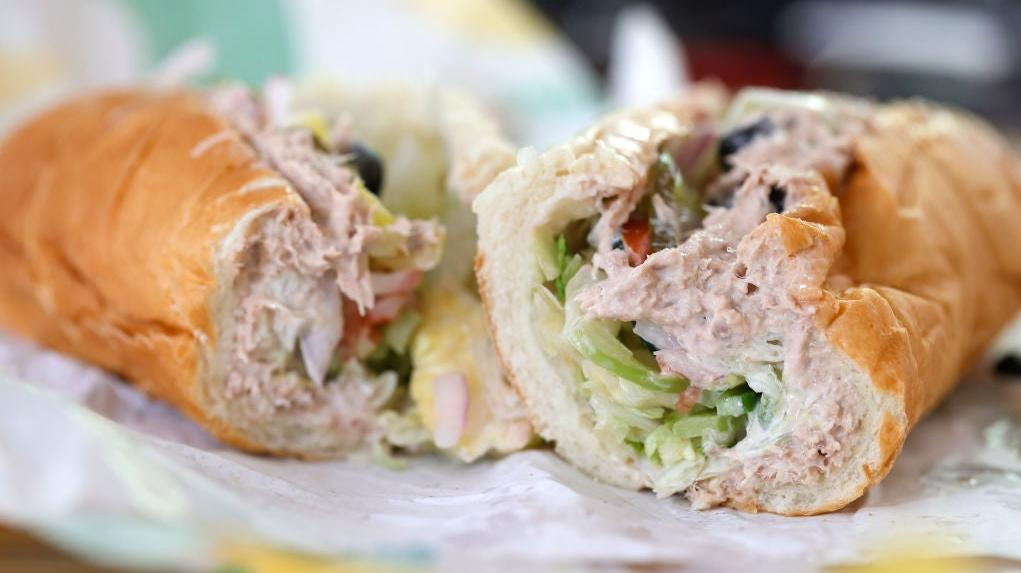We're All Trapped In The Never-Ending Subway Tuna Lawsuit
The original plaintiff wants to take a step back, but now it's Subway that wants justice.
Many food-related lawsuits have made their way through the United States legal system, but perhaps none have had the longevity, nor the twists and turns, of the infamous and ongoing Subway tuna lawsuit.
Ssince 2021, the Subway tuna lawsuit has had us all asking, "What even is tuna, really?" and "do we even care?" At this point, even those involved in the court proceedings are flagging, fatigued by the fishy legality of it all. But before we get into the latest on Subway's battle to defend its tuna's legitimacy in the fast food landscape, let's take a look at how we got here.
The Subway tuna lawsuit, explained
In January 2021, it was reported that two plaintiffs filed a lawsuit against Subway alleging that its tuna was not truly tuna as advertised. The lawsuit accuses Subway of fraud, intentional misrepresentation, and unjust enrichment, and makes several other claims against the chain.
Based on independent lab tests of sandwich samples taken from various Subway restaurants throughout California, the lawsuit alleges that Subway's tuna is actually "a mixture of various concoctions that do not constitute tuna, yet have been blended together by defendants to imitate the appearance of tuna." Subway vehemently denied the claims, and the chain's sourcing material states that it only uses "100% wild-caught" skipjack tuna.
The New York Times later conducted its own independent test and the lab results came back with two possibilities: Either the sample was so heavily processed that the lab could not determine what species it contained, or the sample just didn't contain any tuna.
Following the NYT article, Subway created a website, Subwaytunafacts.com, dedicated to debunking the claims against it. The lawsuit was thrown out by a judge in October 2021, who determined the plaintiffs failed to prove that Subway's tuna didn't actually contain tuna. But we wouldn't be here if that was where the story ended.
The original plaintiffs, Karen Dhanowa and Nilima Amin, chose to file a third version of the suit. This renewed version claims that lab testing proved that Subway's tuna includes animal proteins such as pork, chicken, and cattle, which is a misrepresentation of Subway's advertised "100% tuna."
In a statement responding to this third iteration of the filing, Subway said it's seeking to dismiss the "reckless and improper" lawsuit. The statement also called out the plaintiffs, saying they "filed three meritless complaints, changing their story each time."
What’s happening with the Subway tuna lawsuit now?
All of that brings us to today, and the saga continues—or maybe it doesn't? Reuters reports that Amin is seeking to dismiss the case in San Francisco federal court without prejudice, meaning Amin could choose to sue again later on.
The current plaintiff is looking to take a break from the litigation because she is pregnant and her condition has made her "unable to proceed with the obligations as plaintiff." While Amin aims to focus instead on her health and family, Subway is turning the tables.
The sandwich chain has gone on the offensive, demanding that the proposed class action suit be dismissed and that Amin's lawyers pay at least $618,000 of the company's legal bills. Subway also contends that the "media frenzy" as a result of the lawsuit caused severe harm to the brand. Considering the recap of the saga laid out above, I can't say I disagree with Subway on that point.
So yes, two years later, the tuna lawsuit continues to drag on and make headlines along the way. There's an argument to be made that Subway should take this chance to wash its hands of the matter, but perhaps in the interest of protecting itself from further allegations down the line, Subway is trying to take its own stand. The whole situation stinks, but I'm still not sure whether that smell is tuna or a mixture of various concoctions that do not constitute tuna.
